| Listing 1 - 10 of 21 | << page >> |
Sort by
|
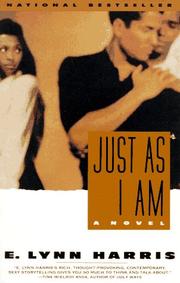
ISBN: 0385469705 Year: 1995 Publisher: New York (N.Y.): Doubleday
Abstract | Keywords | Export | Availability | Bookmark
 Loading...
Loading...Choose an application
- Reference Manager
- EndNote
- RefWorks (Direct export to RefWorks)
African American gays --- African American men --- Bisexuals --- -Bi people --- Bis (Bisexuals) --- Bisexual people --- Sexual minorities --- Afro-American men --- Men, African American --- Men --- Afro-American gays --- Afro-American homosexuals --- Gays, African American --- Gays --- Fiction --- Fiction. --- -Fiction --- -Afro-American men --- Bi people --- Persons
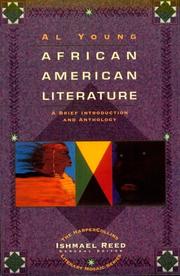
ISBN: 0673990176 Year: 1995 Publisher: New York, NY : HarperCollins Publishers,
Abstract | Keywords | Export | Availability | Bookmark
 Loading...
Loading...Choose an application
- Reference Manager
- EndNote
- RefWorks (Direct export to RefWorks)
LITERATURE --- U.S. --- AFRO-AMERICAN AUTHORS --- ANTHOLOGY --- AFRO-AMERICANS IN LITERATURE
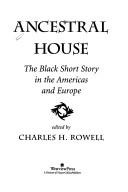
ISBN: 0813320291 Year: 1995 Publisher: Boulder : Westview press,
Abstract | Keywords | Export | Availability | Bookmark
 Loading...
Loading...Choose an application
- Reference Manager
- EndNote
- RefWorks (Direct export to RefWorks)
SHORT STORIES --- AFRICAN LITERATURE --- COMMONWEALTH LITERATURE (ENGLISH) --- AFRO-AMERICAN LITERATURE --- BLACK AUTHORS --- ANTHOLOGY
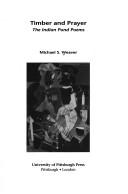
ISBN: 0822978962 0822955547 1322025274 9780822978961 082293873X 0822955544 9780822955542 Year: 1995 Publisher: Pittsburgh
Abstract | Keywords | Export | Availability | Bookmark
 Loading...
Loading...Choose an application
- Reference Manager
- EndNote
- RefWorks (Direct export to RefWorks)
Annotation
American poetry --- African American poetry (English) --- Black poetry (American) --- Negro poetry --- African American authors. --- Afro-American authors --- Negro authors
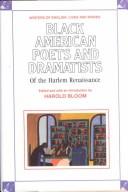
ISBN: 0791022072 0791022323 Year: 1995 Publisher: New York, NY : Chelsea House,
Abstract | Keywords | Export | Availability | Bookmark
 Loading...
Loading...Choose an application
- Reference Manager
- EndNote
- RefWorks (Direct export to RefWorks)
AMERICAN LITERATURE --- AFRO-AMERICANS IN LITERATURE --- HARLEM RENAISSANCE --- AFRO-AMERICAN AUTHORS --- 20th CENTURY --- HISTORY AND CRITICISM --- BIO-BIBLIOGRAPHY
Book
ISBN: 1595587659 9781595587657 Year: 1995 Publisher: New York : New Press, The,
Abstract | Keywords | Export | Availability | Bookmark
 Loading...
Loading...Choose an application
- Reference Manager
- EndNote
- RefWorks (Direct export to RefWorks)
""In this pathbreaking collection of articles, Dr. Beverly Guy-Sheftall has taken us from the early 1830s to contemporary times. Only since the seventies have black women used the term ""feminism."" And yet, it is that concept that she uses to bring into the same frame the ideas and analyses of Maria Stewart, Sojourner Truth, and Frances W.E. Harper of the early nineteenth century, and the work of women such as the late Audre Lorde, Barbara Smith, and bell hooks who stand on the threshold of the twenty-first century... She has refused to cut off contemporary African American women from th
Afro-American women. --- Attitudes. --- Feminism. --- Feminist literature. --- United States. --- African American women --- Social conditions --- United States --- Race relations.
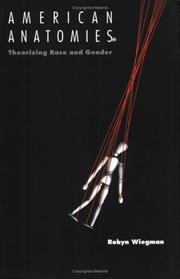
ISBN: 0822315912 0822315769 0822399474 1306896045 Year: 1995 Volume: *9 Publisher: Durham ; London Duke University Press
Abstract | Keywords | Export | Availability | Bookmark
 Loading...
Loading...Choose an application
- Reference Manager
- EndNote
- RefWorks (Direct export to RefWorks)
"In this brilliantly combative study, Robyn Wiegman challenges contemporary clichés about race and gender, a formulation that is itself a cliché in need of questioning. As part of what she calls her "feminist disloyalty," she turns a critical, even skeptical, eye on current debates about multiculturalism and "difference" while simultaneously exposing the many ways in which white racial supremacy has been reconfigured since the institutional demise of segregation. Most of all, she examines the hypocrisy and contradictoriness of over a century of narratives that posit Anglo-Americans as heroic agents of racism's decline. Whether assessing Uncle Tom's Cabin, lynching, Leslie Fiedler's racialist mapping of the American novel, the Black Power movement of the 60s, 80s buddy films, or the novels of Richard Wright and Toni Morrison, Wiegman unflinchingly confronts the paradoxes of both racism and antiracist agendas, including those advanced from a feminist perspective. American Anatomies takes the long view: What epistemological frameworks allowed the West, from the Renaissance forward, to schematize racial and gender differences and to create social hierarchies based on these differences? How have those epistemological regimes changed - and not changed - over time? Where are we now? With painstaking care, political passion, and intellectual daring, Wiegman analyzes the biological and cultural bases of racial and gender bias in order to reinvigorate the discussion of identity politics. She concludes that, for very different reasons, identity proves to be dangerous to minority and majority alike."--pub. desc.
African American women --- Afro-Amerikaanse vrouwen --- Femmes afro-americaines --- United States --- Race relations --- Sex role --- African American women. --- Race relations. --- Afro-American women --- Women, African American --- Women, Negro --- Women --- Race question --- Rôle du sexe --- Etats-Unis
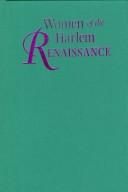
ISBN: 0253114985 0585001251 9780585001258 9780253114983 0253329086 0253209803 9780253329080 9780253209801 Year: 1995 Publisher: Bloomington Indiana University Press
Abstract | Keywords | Export | Availability | Bookmark
 Loading...
Loading...Choose an application
- Reference Manager
- EndNote
- RefWorks (Direct export to RefWorks)
American literature --- Women and literature --- African American women --- African American women in literature --- African Americans in literature --- Harlem Renaissance --- English literature --- Agrarians (Group of writers) --- Literature --- New Negro Movement --- Renaissance, Harlem --- African American arts --- Afro-Americans in literature --- Negroes in literature --- Afro-American women in literature --- Afro-American women --- Women, African American --- Women, Negro --- Women --- African American authors --- History and criticism --- History --- Women authors --- Intellectual life --- United States --- 20th century --- Fauset, Jessie Redmon --- Criticism and interpretation --- Hurston, Zora Neale --- Larsen, Nella --- Harlem (New York, N.Y.) --- New York (State) --- New York (N.Y.) --- African American women in literature. --- African Americans in literature. --- Harlem Renaissance. --- Women authors. --- History and criticism. --- Intellectual life.
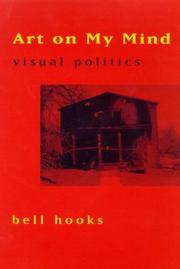
ISBN: 1565842634 9781565842632 Year: 1995 Publisher: New York : New Press : Distributed by W.W. Norton,
Abstract | Keywords | Export | Availability | Bookmark
 Loading...
Loading...Choose an application
- Reference Manager
- EndNote
- RefWorks (Direct export to RefWorks)
African American art --- 7.01 --- afro-amerikanen --- Amos Emma --- Basquiat Jean-Michel --- gender studies --- Gonzalez-Torres Felix --- Humphreys Margo --- kunst --- kunsttheorie --- Saar Alison --- Verenigde Staten --- Weems Carrie Mae --- Wells-Bowie LaVerne --- Afro-American art --- Art, African American --- Negro art --- Ethnic art --- Political aspects --- Hooks, Bell --- Philosophy. --- Political aspects. --- hooks, bell, --- Hooks, Bell,
Book
ISBN: 187971406X Year: 1995 Publisher: New Orleans Louisiana Landmarks Society
Abstract | Keywords | Export | Availability | Bookmark
 Loading...
Loading...Choose an application
- Reference Manager
- EndNote
- RefWorks (Direct export to RefWorks)
Jazz --- Louisiana --- New Orleans, La. --- History and criticism --- African American dance --- African Americans --- Afro-Americans --- Black Americans --- Colored people (United States) --- Negroes --- Africans --- Ethnology --- Blacks --- Afro-American dance --- Dance, African American --- Dance --- History --- Social life and customs --- Congo Square (New Orleans, La.) --- New Orleans (La.) --- Place des Nègres (New Orleans, La.) --- History. --- Black people
| Listing 1 - 10 of 21 | << page >> |
Sort by
|

 Search
Search Feedback
Feedback About UniCat
About UniCat  Help
Help News
News